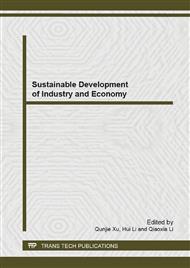p.732
p.737
p.741
p.746
p.750
p.754
p.758
p.762
p.766
An Empirical Study of Environmental Tax's Unbalanced Effect on Regional Sustainable Development: Based on the Panel Data Analysis of Resource Tax in 29 Provinces and Cities in China
Abstract:
The paper made a regression analysis with the panel data of 29 provinces and cities in China from 1996 to 2010 based on Cobb-Douglas production function introducing the tax variable. The results show that the growth of per unit resource tax may extend the economic growth1.0325, 1.0243, and 1.0661 times in eastern, middle and western areas respectively. Meanwhile, when the ratio of the resource tax among the general fiscal income increase by 1%, the output elasticity of capital may increase by10.21%, 15.59% and 14% in tune, the output elasticity of labor may decrease by 22.02%, 17.47% and 13.95%. This suggests that from the perspective of perfecting the resource tax to study environmental tax levy can better rationalize resource price mechanism, and environmental tax is a very important economic method to carry out the stratagem of regional sustainable development, but there is unbalanced effect on different areas.
Info:
Periodical:
Pages:
750-753
Citation:
Online since:
December 2013
Authors:
Price:
Сopyright:
© 2014 Trans Tech Publications Ltd. All Rights Reserved
Share:
Citation:


